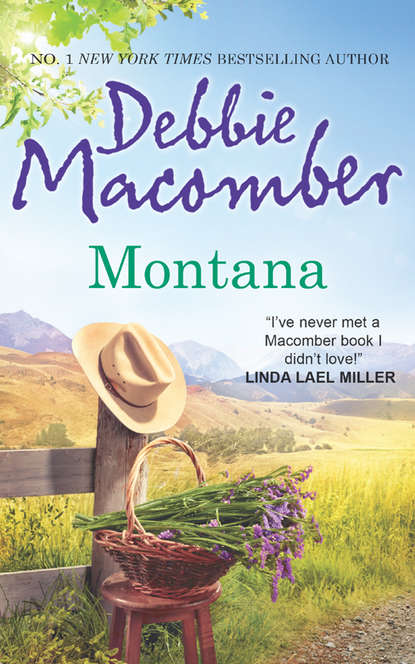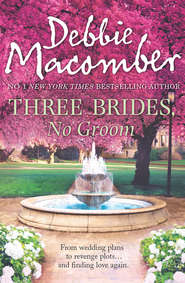По всем вопросам обращайтесь на: info@litportal.ru
(©) 2003-2024.
✖
Montana
Автор
Год написания книги
2018
Настройки чтения
Размер шрифта
Высота строк
Поля
“I told you this has nothing to do with your father!” It bothered Molly that her son would assume she’d lie to him. There was nothing she abhorred more than lying. Daniel had taught her and their children more than enough on that subject. “I wouldn’t lie to you.”
“Then what’s wrong?” Clay moved into the kitchen and Molly held out her arms to her youngest son. Clay didn’t object to an occasional hug, but Tom had let it be known he was much too old for that sort of thing—and much too cool to display affection toward his mother. She respected his wishes, and at the same time longed for the times when they could share a simple hug.
“It’s Gramps,” she said. Her throat started to close and she couldn’t say more.
Clay wrapped his arms tightly around her waist and pressed his head to her shoulder. Molly sighed deeply.
“Is Gramps sick?” Tom asked, shoving his hands in his pockets. He paced restlessly, back and forth across the kitchen floor. It’d become a habit of his lately, a particularly irritating one. Oh, yes, Molly thought, sighing again. The last twelve months had been hard on all of them. Tom seemed to be having the toughest time coping with everything—the public humiliation of his father’s trial for fraud, the lack of any extra money and then the move from a spacious three-bedroom house to a cramped two-bedroom apartment. But this place was the best she could do, and his dissatisfaction underscored her own feelings of inadequacy.
“Gramps’s heart is giving him trouble,” Molly finally answered. She spoke in a low toneless voice.
“Are we going to go see him?”
Molly brushed the hair from Clay’s brow and gazed down on his sweet boyish face. “I don’t know yet.”
“But, Mom, don’t you want to?” Tom cried.
That hurt. Of course she did. Desperately. If she had the choice, she’d be on the first plane out. “Oh, Tom, how can you ask me that? I’d give anything to be with Gramps.”
“Then let’s go. We can leave tonight.” Tom headed toward the bedroom he shared with his younger brother, as if the only thing they needed to do was toss a few clothes in a suitcase and walk out the door.
“We can’t,” she said, shaking her head, disheartened once again by the reality of their situation.
“Why not?” Tom’s voice was scornful.
“I don’t have enough—”
“Money,” her oldest son finished for her. He slammed his fist against the kitchen counter and Molly winced, knowing that the action must have been painful. “I hate money! Every time we want to do something or need something, we can’t, and all because of money.”
Molly pulled out a kitchen chair and sagged into it, her energy gone, her spirits deflated by anger and self-pity.
“It’s not Mom’s fault,” Clay muttered, placing his skinny arm around her shoulders, comforting her.
“I don’t know what to do,” Molly said, thinking out loud.
“If you wanted to go by yourself,” Tom offered with a show of reluctance, “I could baby-sit Clay.”
“I don’t need a baby-sitter,” Clay insisted. “I can take care of myself.” He glared at his older brother, challenging Tom to proclaim otherwise.
“I can’t leave now, with or without you boys,” Molly told them sadly. She had less than twenty dollars in her checking account. It was the all-too-familiar scenario—too much month at the end of her money.
“I remember Gramps,” Tom said suddenly. “At least I think I do.”
The last time Molly had visited the ranch was shortly after her divorce almost ten years ago. Her grandmother, who’d already been ill at the time with a fast-spreading cancer, had died shortly afterward. Gramps had asked Molly to come live with him, and for a while she’d seriously considered the invitation. She told herself now that if she’d had any sense, she would have taken him up on his offer. She might actually have done it if she’d managed to find work. Fluent in both French and German, Molly was employed on a contract basis by an import agency. Unfortunately there wasn’t much call for her skills in the cattle country of western Montana.
During that visit Tom had been four and Clay still in diapers. Whatever memories Tom had were more likely the stories she’d told him about the ranch. Tucked against the foothills of the Bitterroot Mountains, the Broken Arrow was one of the lonely ranches scattered through the Flathead River valley. Molly often talked about it, especially after a letter arrived from Gramps. There weren’t many, only two or three a year. Her grandmother had been the one who’d taken care of family correspondence. Molly had discovered that Gramps hated talking on the phone even more than he hated writing letters; nevertheless, he made the effort to keep in touch with her. Each one of his letters was read countless times and treasured. Losing his lifelong love had devastated him, and even now, nine years after her passing, Gramps mentioned his wife in every single letter, every conversation.
Molly always answered his letters and routinely mailed him pictures of the boys. Over the years they’d talked on the phone a number of times but their conversations had obviously been uncomfortable for him. Gramps never had been much of a talker, nor was he like the stereotypical kindly old characters who populated kids’ storybooks. Nope, he was actually a bit of a curmudgeon. He yelled into the telephone as if he thought that was necessary in order to be heard and fretted constantly over what the call was costing.
No small man, he stood a good six-two and weighed at least two hundred pounds. Four-year-old Tom had found his appearance so scary that he’d clung to her leg the first few days of their visit. Clay had buried his face in her shoulder and wailed the instant Gramps came into view. Her grandfather didn’t have the slightest idea how intimidating he could be to small boys.
Had it really been nine years since she’d last seen him? It seemed impossible, yet she knew it was true.
“He yelled,” Tom murmured, lost in his own thoughts.
That was Gramps, all right. He was gruff and impatient and about as subtle as a gun in your face. To really know him was to love him, but he rarely gave anyone the opportunity to get that close. Never afraid to voice his opinions, Gramps went out of his way to make sure folks around him knew what he thought and why; anyone who dared to disagree was called a “danged fool.” Usually to his—or her—face.
When Molly’s grandmother was alive, she’d smoothed the waters. Her charm and humor had more than compensated for Walt Wheaton’s prickly nature. By now, Gramps had probably alienated just about everyone in Sweetgrass.
The foreman who’d phoned said he’d been around for more than six months. If Gramps had mentioned hiring a foreman in any of his letters, she’d missed it—hard to believe, considering how often she’d read them. But knowing Gramps, he’d rather chew nails than admit he needed help.
Sam Dakota. The name sounded almost familiar. She grinned weakly, allowing herself to be amused for just a moment—maybe she was confusing him with South Dakota. Or maybe Gramps had mentioned him, but not in a discussion about hired hands. She was sure of that.
The boys went to bed that evening with a minimum of fuss, for which Molly was grateful. She followed soon after, weary to the bone.
It shouldn’t have come as a surprise that she couldn’t sleep. Every time she closed her eyes, all she could see was Gramps. All she could think about was the cantankerous old man she loved.
At midnight, Molly gave up the effort and turned on the light. Tossing aside the covers, she went to her desk and sorted through the drawers until she found the last letter she’d received from Gramps. She sat on her bed, legs crossed, and read it slowly.
Dear Molly,
Thanks for the pictures of you and the boys. They sure don’t look like they’re any relation to us Wheatons, do they? Guess I can’t hold it against them that they resemble their father. They aren’t to blame for that. The picture of you is another story. Every time I pick it up, it’s like seeing my own sweet Molly at your age. Only she wore her hair long.
I don’t understand what’s with women these days. They cut their hair short like they want to be men. Ginny Dougherty, the gal who ranches the spread next to mine, for instance—damn fool woman thinks she can tend a herd as good as a man, so she decides to look like one. She might be a handsome woman if she kept her hair long and even wore a dress. I tell you, her husband would turn over in his coffin if he could see what she’s done to herself.
As for the hair business, I’ll admit men aren’t much better. Seems a lot of them prefer to wear it long—like back in the sixties, hippies and all. But I never thought I’d see grown men—gray-haired geezers, for Pete’s sake!—wearing ponytails. Even worse—what do you call them?—those pigtails. Far as I’m concerned Willie Nelson’s got a lot to answer for.
It isn’t just the way people do their hair, either. More and more strange things are going on in Sweetgrass. A man doesn’t know who to trust any longer. People talk as if the government was the enemy. I didn’t fight in a world war to hear that kind of crazy talk, but then folks around here never have been keen for my opinion. I give it to them, anyway, whether they want to hear it or not.
The weather’s been good and bad. Winter hasn’t been too hard so far—only one blizzard.
The chickens are laying more eggs than I can use, which means they’re content. There’s nothing better than bacon and eggs for breakfast. I hope you’re feeding the boys a decent breakfast every morning and not that sugar-coated junk.
Now about you. It sounds like Daniel finally got what he’s deserved all along. Imagine cheating those decent folks out of their hard-earned cash! I never did understand why you married that smooth talker. I knew the minute I met him he wasn’t any good. If you’d asked me before you were foolish enough to go through with the wedding, you might have saved yourself a lot of trouble. Well, at least you have your boys, so something good came out of the marriage.
You’re my only grandchild, Molly, and you’re all I have left. You know that. I remember the day you were born and your father called to say Joan had given birth to a girl. Your grandmother wept when she learned your parents decided to name you after her. They must have known something even then, because small as you were, you resembled my Molly, and you do so more every year. She was a beautiful woman, and you are, too.
I wish your marriage had been like ours. It was the best thing in my life, Molly. I’m glad you’re rid of that no-good Daniel, but I wish you’d marry again. Though I suppose that subject’s best saved for another day.
I want to talk to you about something else. I recently celebrated my seventy-sixth birthday, so I decided it was time I got my affairs in order. I had a new will drawn up. When I was in town last week, I stopped off and talked to Russell Letson. He’s an attorney who’s been around awhile, and his father and I used to be friends. I like Russell well enough, even though I suspect most attorneys are shysters. Anyway, I brought in my old will, and Russell and I talked a bit and he asked me a bunch of questions that got me to thinking.
There’s certain things you should know. First off, I’ve got a safe-deposit box at the bank. I put some medals in there from the war. When the time is right and they appreciate that sort of thing, you can give those medals to my great-grandsons. I suppose I should put your grandmother’s wedding band in there, but I never could bring myself to part with it. I got it on the nightstand next to the bed. Nine years she’s been gone, and I still miss her.
The ranch will be yours. I wish you’d moved here after Molly died, but I understood why you decided to return to California. For myself, I don’t know how you can breathe that foul air—I’ve seen what San Francisco’s like, on television. It can’t be good for the boys to be taking in all that smog. I’m hoping that after I’m gone you’ll give Sweetgrass another try. Folks here are hardworking and decent. Most years, the ranch should at least break even. And the house is solid. My father built it in 1909, and after he died, Molly and I added electricity and indoor plumbing. As houses go, it isn’t fancy, but it’s stood all these years and will stand longer.
That pretty well takes care of what I wanted to tell you.
I love you, Molly girl, and those youngsters of yours, too. I’m sure you know that, although I’m not one to say it often. This letter seemed like a good time to do it.











